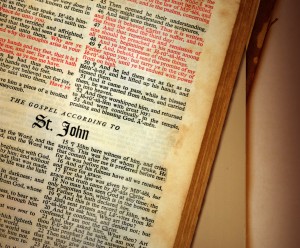 BATON ROUGE, La. — A Louisiana lawmaker has scrapped a bill that sought to make the Bible the state book after fellow legislators claimed that it was causing a ‘distraction’ from other issues needing to be addressed in the House.
BATON ROUGE, La. — A Louisiana lawmaker has scrapped a bill that sought to make the Bible the state book after fellow legislators claimed that it was causing a ‘distraction’ from other issues needing to be addressed in the House.
As previously reported, Representative Thomas Carmody (R-Shreveport) recently filed HB 503 at the request of Shreveport resident Randy Dill. Dill told local television station KTBS that he has had the desire to make the Bible the state book since 1988, but could not find a lawmaker to help make it happen.
“The Bible was their main inspiration along with our forefathers—Washington and all of them,” he stated. “They looked to it for their inspiration for our country. They called upon God to help us.”
Carmody’s original bill sought to make a specific copy of the Bible in state possession the official state book.
“The official state book shall be the Holy Bible, published by Johannes Prevel, (Prevel, Jean, active 1510-1528, printer, & Petit, Jean, fl. 1492-1530.), which is the oldest edition of the Holy Bible in the Louisiana State Museum system,” HB 502 outlined. “The use on official documents of the state and with the insignia of the state is hereby authorized.”
However, Carmody altered the language of the proposal before it was considered in committee, changing out the Prevel copy of the Bible to the King James translation of the Scriptures.
But some lawmakers stated that the alteration was still too narrow, as it would leave out the Catholics in the state. Others rejected the bill altogether, fearing a lawsuit over the separation of church and state.
On Monday, Carmody announced that he would not be moving forward with the bill due to assertions that the legislation was becoming a distraction from “more important debates,” such as the state budget, according to the Associated Press.
But Douglas Laycock, a professor at the University of Virginia School of Law, told the Greater New Orleans Times-Picayune that the legislation would have been fine if passed, even if it was challenged in court of law.
“Judges are likely to think that this is de minimis—to minor to care about,” he said. “They don’t tell the president that he can’t issue Thanksgiving proclamations or host a national prayer breakfast, and judges are likely to view this the same way.”
“It’s not like a government-sponsored prayer at a public meeting, or a government-sponsored religious monument in a particular place, which burdens the particular individuals who attend that meeting or frequent that place,” Laycock continued. “This would just sit there in the statute books, affecting everyone in Louisiana more or less equally. That often means that no one can challenge it in court.”
Become a Christian News Network Supporter...


